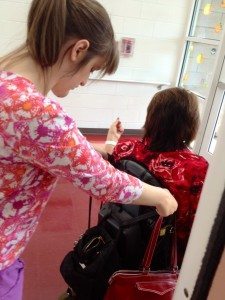
She stuffed the fries back in the box, shoved it into the McDonald’s bag, and stood up midway in her meal.
“Madison, are you finished?” I said.
She flashed a smile and lumbered over to my wheelchair.
I could tell that her words weren’t with her that day. “Are we ready to say goodbye?” I prompted. “Already?” I looked up at her and saw her mission-driven eyes. I wasn’t sure what was next, but finishing the lunch I’d brought into school that day was apparently no longer on her schedule. “Well, okay, then, Madison. Give Mommy kiss.”
I lifted my cheek to her, but she dodged me, and instead went around my outstretched arms to the back of my wheelchair.
“Madison what are you doing?”
“She’s trying to push you, Becky,” Rachel, our family caregiver, said.
“Oh my, she hasn’t done that in years,” I said as I twisted around to try to see Madison’s eyes again. I knew she couldn’t push me as she had when I was first paralyzed 16 years ago and used a manual wheelchair. Madison was 5 years old and in lieu of words would often push me where she wanted me to go, including almost sending me over the edge of a six-inch drop into my family room to get a Barney tape. I quickly learned to keep her in front of me, read her eyes, and lock my brakes at all times.
“One minute, Madison,” I said to her then told the others who’d joined us for lunch, “She’s not going to be able to push me in this power wheelchair. It weighs over 300 pounds. I guess I better anticipate where I think she wants to go.”
I moved my joystick forward and we went to the lobby. Madison was behind me, clutching my push handles.
“Give mommy kiss,” I said, thinking she would dismiss me at the lobby door.
But she persisted, trying to push me out the door.
“Maybe she misses going out for lunch,” I suggested and the others agreed. So Rachel brought my van around and sure enough Madison let go of my push handles, marched up the ramp into my van, and plopped into the back seat, snapping on her seat belt. Her one-on-one joined us.
“Let’s drive around the parking lot once,” I said. “Maybe she just misses time in the van.” We made one pass in the parking lot loop and tried to say goodbye again.
She wouldn’t budge.
So we drove farther, several miles. Again, she wouldn’t budge. She guarded her seat belt buckle with one hand, forcefully pushing away anyone who tried to release it with the other.
“What do you want, Madison?” I asked. Often she would say, “Schedule please,” or “McDonald’s,” or “Cheetos.”
But her words continued to fail her.
I got out of the van and coaxed her. “Come see Mommy, Madison. Want to watch Mary Kate and Ashley? Barney? Want Cheetos?”
No deal.
She sat there, buckled in tight. She started to get antsy, a pre-upset warning, and I started to get worried. Her one-on-one went into the school and came back with three staff members and a large pillow. They approached Madison from each of the sliding doors and from the hatchback door in the rear.
Parked in front of the van, I clasped my hands across my heart, shut my eyes, and prayed. After what seemed like forever, I heard her heavy footsteps on my ramp. Hand in hand with a staff member, she headed into the school. I dared not break the momentum with a goodbye.
“How did they get her to go in?” I whispered to Rachel once they were inside.
“I think they asked her if she wanted to read her Baby Bop book.”
“My word,” I muttered. “Baby Bop beat out Barney? I would have never thought of that.”
And we left, grateful for creative caregivers who knew how to help Madison when her words failed her.
This column was originally published as part of my “Tuesdays with Madison” series at AutismAfter16.com.
Follow Me!